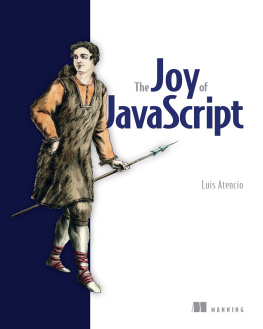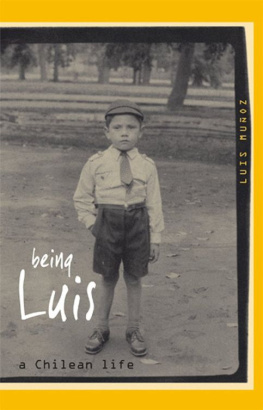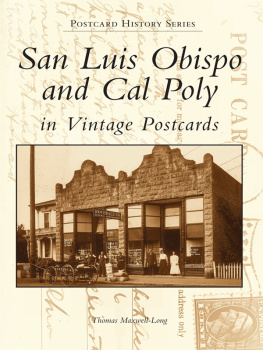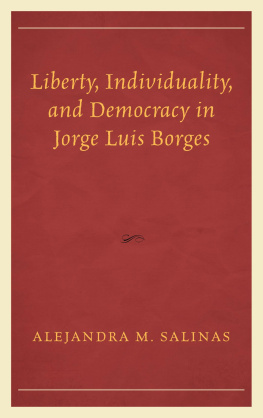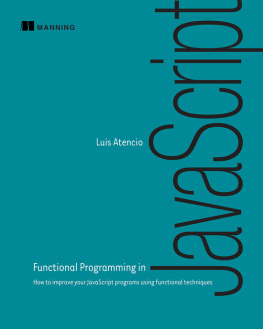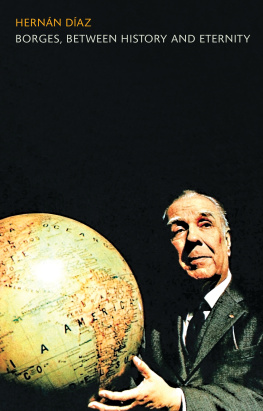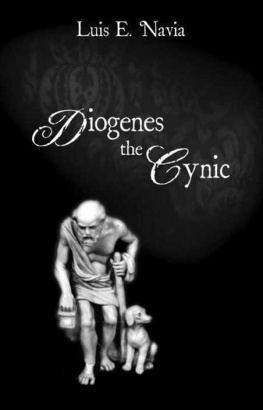Luis Atencio - The Joy of JavaScript
Here you can read online Luis Atencio - The Joy of JavaScript full text of the book (entire story) in english for free. Download pdf and epub, get meaning, cover and reviews about this ebook. year: 2021, publisher: Manning Publications Co., genre: Home and family. Description of the work, (preface) as well as reviews are available. Best literature library LitArk.com created for fans of good reading and offers a wide selection of genres:
Romance novel
Science fiction
Adventure
Detective
Science
History
Home and family
Prose
Art
Politics
Computer
Non-fiction
Religion
Business
Children
Humor
Choose a favorite category and find really read worthwhile books. Enjoy immersion in the world of imagination, feel the emotions of the characters or learn something new for yourself, make an fascinating discovery.
- Book:The Joy of JavaScript
- Author:
- Publisher:Manning Publications Co.
- Genre:
- Year:2021
- Rating:3 / 5
- Favourites:Add to favourites
- Your mark:
- 60
- 1
- 2
- 3
- 4
- 5
The Joy of JavaScript: summary, description and annotation
We offer to read an annotation, description, summary or preface (depends on what the author of the book "The Joy of JavaScript" wrote himself). If you haven't found the necessary information about the book — write in the comments, we will try to find it.
The Joy of JavaScript — read online for free the complete book (whole text) full work
Below is the text of the book, divided by pages. System saving the place of the last page read, allows you to conveniently read the book "The Joy of JavaScript" online for free, without having to search again every time where you left off. Put a bookmark, and you can go to the page where you finished reading at any time.
Font size:
Interval:
Bookmark:
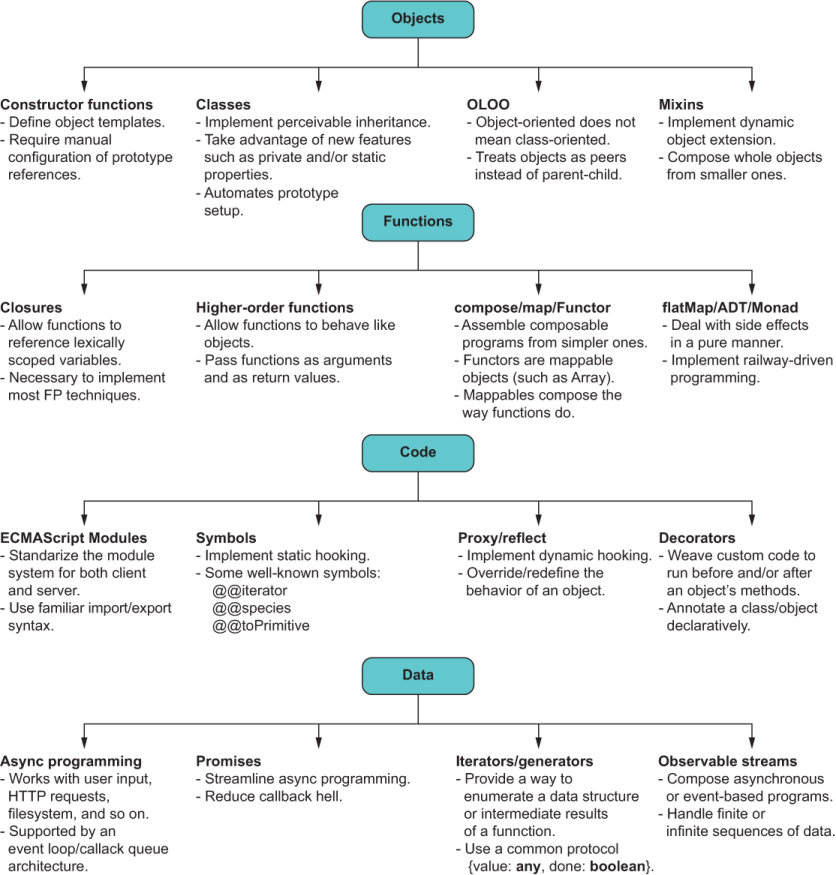

Luis Atencio
To comment go to liveBook

Manning
Shelter Island
For more information on this and other Manning titles go to
manning.com
For online information and ordering of these and other Manning books, please visit manning.com. The publisher offers discounts on these books when ordered in quantity.
For more information, please contact
Special Sales Department
Manning Publications Co.
20 Baldwin Road
PO Box 761
Shelter Island, NY 11964
Email: orders@manning.com
2021 by Manning Publications Co. All rights reserved.
No part of this publication may be reproduced, stored in a retrieval system, or transmitted, in any form or by means electronic, mechanical, photocopying, or otherwise, without prior written permission of the publisher.
Many of the designations used by manufacturers and sellers to distinguish their products are claimed as trademarks. Where those designations appear in the book, and Manning Publications was aware of a trademark claim, the designations have been printed in initial caps or all caps.
Recognizing the importance of preserving what has been written, it is Mannings policy to have the books we publish printed on acid-free paper, and we exert our best efforts to that end. Recognizing also our responsibility to conserve the resources of our planet, Manning books are printed on paper that is at least 15 percent recycled and processed without the use of elemental chlorine.
| Manning Publications Co. 20 Baldwin Road Technical PO Box 761 Shelter Island, NY 11964 |
Development editor: | Frances Lefkowitz |
Technical development editor: | Peter Perlepes |
Review editor: | Aleks Dragosavljevi |
Production editor: | Deirdre S. Hiam |
Proofreader: | Melody Dolab |
Technical proofreader: | Jahred Love |
Typesetter: | Dennis Dalinnik |
Cover designer: | Marija Tudor |
ISBN: 9781617295867
To my children, Luke and Matthew, and my wife, Ana, for being my support pillars in life and helping me at every step of this journey. To all of my family for their love and support. Thank you.
I learned to program computers in a traditional, academic way. The universities I attended based their curricula primarily on class-oriented languages such as Java, C++, and C#. When I came out of those programs, my brain was trained to think that classes were the best (maybe even only) way to design programs and that anything else would be an abomination.
Years later, like any other developer in the world, I stumbled onto JavaScriptI should say jQuery, because at the time, jQuery was JavaScript. JavaScript was diametrically opposite to most of what I had learned. I struggled with every fundamental aspect of programming, including representing domain models, encapsulating behavior and data into logical modules, and dealing with events and asynchronous functions. I said to myself, Fine, lets use jQuery and a slew of third-party libraries to fix the language and forget all about this.
But JavaScript didnt need fixing: I needed to get fixed. I knew I couldnt get away from it. Because JavaScript was pretty much everywhere, it was only a matter of time before Id stumble onto it again, so I decided to explore it more deeply. Learning about its prototype mechanism and closures showed me the true meaning of object-oriented programming. When Alan Kay invented this term in the early 2000s, he wanted to bring together concepts such as message-passing (objects passing or sending messages to other objects), encapsulation (exposing only whats necessary), and dynamic linking (resolving properties of an object by name at runtime). Unlike all the other languages Id learned, JavaScript had these principles deeply rooted in its design; more important, the concepts were easily accessible to developers. Then it dawned on me that I finally understood programming.
Armed with newfound motivation, I continued learning about JavaScript and found higher-order functions, which opened my eyes to functional programming and composable software. Suddenly, programming wasnt frustrating; it was a joy. This realization propelled my career as an author of books such as Functional Programming in JavaScript (Manning, 2016), RxJS in Action (Manning, 2017), and now The Joy of JavaScript (Manning, 2021).
This book is for developers who, like me, have had the good fortune to learn about amazing features such as closures, prototypes, and higher-order functions, and want to take them to the next level so that they can enjoy working with JavaScript every single day. The Joy of JavaScript shows what the language has to offer on its own, without any third-party libraries and frameworks. Due to the sheer number of topics surrounding JavaScript, this book doesnt spend much time digging into basic concepts (but offers good resources for them); neither is it a guide to writing ECMAScript 2019, 2020, and so on. Rather, it gives you a close-up view of exciting topics, trends, and techniques that will allow you to master areas of the language that you probably didnt know existed. As a bonus, the book introduces you to some additions to the language that may land in the years to come. Its valuable to learn about these proposals so that youll understand where the language is headed and how its evolving.
Writing this book helped me get through these uncertain and anxious times, and I sincerely hope that you find the same joy in reading it that I did writing it. While working on this manuscript, I gained a fresh perspective on programming as a whole, and I hope that it does the same for you.
This book was a lot of work. But I believe that all that work resulted in a fine book that nicely complements whats already out there, and I hope that you will think so as well.
Id like to thank quite a few people for helping me along the way.
First and foremost, I want to thank my wife, Ana. Youve always supported me, always patiently taking care of things (including our two amazing boys, Luke and Matthew) while I struggled to get this book done. You always made me believe I could finish it. I love you.
Next, Id like to acknowledge my longtime, flawless editor at Manning, Frances Lefkowitz. Thank you for working with me, guiding me every step of the way, and making the writing process delightful (not to mention bearable). Your commitment to the quality of this book made it better for everyone who will read it. Thanks as well to all the other folks at Manning who worked with me on the production and promotion of the book: Deirdre Hiam, and Melody Dolab. It was truly a team effort.
Id also like to thank the reviewers who took the time to read my manuscript at various stages during its development and who provided invaluable feedback: Al Pezewski, Alberto Ciarlanti, Amit Lamba, Birnou Sbarte, Daniel Posey, Daniel Bretoi, Dary Merckens, Dennis Reil, Didier Garcia, Edwin Kwok, Foster Haines, Francesco Strazzullo, Gabriel Wu, Jacob Romero, Joe Justesen, Jon Guenther, Julien Pohie, Kevin Norman D. Kapchan, Kimberly Winston-Jackson, Konstantinos Leimonis, Jahred Love, Lora Vardarova, Matteo Gildone, Miranda Whurr, Nate Clark, Pietro Maffi, Rance Shields, Ray Booysen, Richard Michaels, Sachin Singhi, Satej Kumar Sahu, Srihari Sridharan, Ubaldo Pescatore, and Vctor M. Prez.
Font size:
Interval:
Bookmark:
Similar books «The Joy of JavaScript»
Look at similar books to The Joy of JavaScript. We have selected literature similar in name and meaning in the hope of providing readers with more options to find new, interesting, not yet read works.
Discussion, reviews of the book The Joy of JavaScript and just readers' own opinions. Leave your comments, write what you think about the work, its meaning or the main characters. Specify what exactly you liked and what you didn't like, and why you think so.

